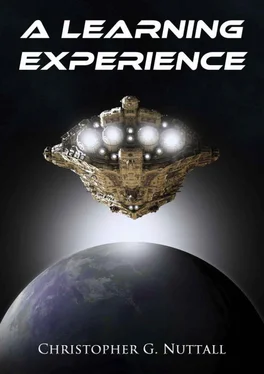“They said there was nothing they could do for her,” the mother said, tearfully. “She wasn’t important or wealthy.”
Mariko looked at the scan results and nodded in understanding. The girl was suffering from AIDS, which suggested that one or both of her parents also had the disease. A quick glance revealed no evidence of abuse, let alone rape; she gritted her teeth, then keyed the machine to produce the cure. Given the right treatment, AIDS could be held in remission indefinitely, but those treatments were expensive. Who was going to offer them to such a poor child?
“You’ll need treatment too,” she said. Up close, the girl’s mother didn’t look very good either. “I’ll scan you too, then prepare treatment. What happened to her father?”
“I have no fucking idea,” the woman snarled. The hatred in her voice was overlaid by misery. “He just up and left. Doesn’t even know he has a daughter.”
Mariko sighed. The woman could have requested help, but that would have resulted in a long series of intrusive questions from the administrators. Mariko had dealt with social workers before; some of them were good and decent people, doing their best for their charges, but others seemed to assume they had licence to pick apart their charges’ lives. Big Sister, with all the power and almost no accountability. Who were the poor and destitute going to complain to, faced with the might of the federal bureaucracy?
“No, probably not,” she said. She picked up a scanner and pressed it against the woman’s arm, then nodded as she saw the results. Her HIV hadn’t yet become AIDS, but it would soon enough. “What do you do for a living?”
The woman glowered, but said nothing.
Prostitute , Mariko thought. She produced two pills, one of which she passed to the girl. She hesitated, eying it doubtfully, then swallowed. Mariko gave her a glass of water, then passed the other pill to the mother. It would, assuming that everything went well, cure her completely. But it would do her no good if she went out and caught it again.
“I’d like you both to wait two weeks, then take one of these a day for the next week,” she said, reaching into a cabinet to produce the immune boosters. “If either of you show any reaction to the first set of treatments, come back here at once. But you shouldn’t.”
She looked down at the girl. They were always cute at that age, she knew, remembering her own daughter. But with AIDS it was unlikely — it had been unlikely — that she would have reached twenty before she died. And, given her circumstances, by then she would probably have slipped into prostitution like her mother. Mariko wanted to take her away from it all, but to where? She pulled the mask of dispassion over her face, refusing to admit to her feelings. Later, she knew she would curl up in bed and cry.
“Good luck,” she said, as she helped the girl off the table. “Come back if you have any problems.”
The girl hugged her, then followed her mother out of the examination chamber. Mariko took a long moment to gather herself, then called for the next patient. He was a balding middle-aged man, who seemed surprisingly dignified despite his illness. A quick check revealed that he had paid his fee without fuss, so Mariko scanned him quickly. He was suffering from a nasty form of cancer that would be hard for human technology to remove.
“Stay still,” she said, as she pressed a piece of alien technology against his head. “This will only take a few minutes.”
She shook her head in awe as the cancer was rapidly broken down into harmless debris, which would be expelled from the body soon enough. The man — he turned out to be a Wall Street Stockbroker — thanked her loudly, then offered whatever help she required to make the clinic a success. Mariko thanked him for the offer, then sent him out and called for the next client. The small boy who entered looked thoroughly miserable.
“He’s been behaving oddly all year,” his mother said. Her voice was frustrated enough to convince Mariko not to snap at her for bringing an undiagnosed patient to her clinic. “He won’t take a bath, he’s been throwing screaming fits whenever we go out and he’s… well, he’s been trying to harm himself. I really don’t know what’s wrong with him!”
Mariko was starting to have a very nasty idea. The way the boy cringed away from her was worrying, despite her decidedly non-threatening appearance. And not taking a bath… she could smell him from several metres away. Hell, that might have been why her receptionist had sent the mother and her son in as soon as possible. His smell would have been very unpleasant in small quarters.
“Let me see,” she said, and scanned him. There was surprisingly little overt damage, at least on the surface, but there were quite a few internal telltale scans. She carefully adjusted the scanner so it was covertly scanning the mother, then looked up at her. “Do you have any idea what might be wrong with him?”
“No,” the mother said. The scanner indicated she was telling the truth. “We wanted to take him to a psychologist, but they cost…”
“You should take him to the police,” Mariko said, sharply. It was her duty as a doctor to report signs of abuse. If the woman didn’t take her kid, Mariko would have to make a report herself. “Someone has been abusing him.”
The mother’s mouth dropped open. “But…”
Mariko sighed. She’d seen child abuse before and quite a few parents missed the signs completely. The problems normally built up over time, so the parents overlooked them as they materialised, while an outsider saw them at once.
“He’s trying to make himself unattractive,” she said, bluntly. “That’s why he refuses to wash. Maybe that alone wouldn’t be significant” — she’d once come across a girl who’d read The Witches and refused to take baths for several months — “but there are other worrying signs. One of them are internal scars in his anus. Something forced a penis or a finger in there.”
She carefully copied her results onto a USB stick, then passed it to the stunned woman. “Go to the police,” she said, as she healed the damage. There would be a permanent record for the police, even though there would be no physical damage any longer. “Find out who did this to him and make them pay.”
It didn’t sound like it was the father, thankfully, she noted as she called for an escort for the woman and her child. If the boy wanted to go with his parents, it suggested the real cause of the problem was the babysitter… if there was a babysitter. A girl, perhaps; it was quite possible that the boy had flinched from Mariko because his abuser was also a girl. She watched them go, then sunk down on her chair and put her head in her hands. There were times when she really hated being a doctor.
“Poor bastard,” she muttered.
There were things she could do, she knew. She could offer to transport them to the moon, if the husband had skills the colony could use. Or she could erase memories from the boy’s mind, allowing him to grow up without having his development stunted. Or… perhaps she could track down the abuser herself and ensure that Steve and a few of his friends administered some very real justice. But she knew she couldn’t do any of them.
She stared down at her hands for a long moment, then stood and called for the next patient.
* * *
Abdul Al-Kareem had never really expected to get the call. He and his brothers had been inserted into America five years ago and told to be American in every way they could, as long as it didn’t compromise their ability to do the mission when the time came. They’d opened an Iranian restaurant, introduced thousands of Americans to the joys of Iranian food and generally acted like model Americans. Abdul himself had a steady stream of relationships, while one of his brothers had married an American girl and the other had a steady relationship going that might turn into marriage. There had been no reason to expect that the world would turn upside down.
Читать дальше












